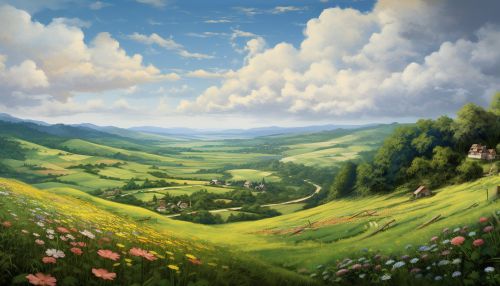Germany
Geography
Germany, officially known as the Federal Republic of Germany (Bundesrepublik Deutschland), is located in Central Europe. It is bordered by nine countries: Denmark to the north, Poland and the Czech Republic to the east, Austria and Switzerland to the south, France to the southwest, and Belgium, Luxembourg, and the Netherlands to the west.


The country's terrain varies significantly from north to south. The northern plains are home to rich agricultural land and major cities such as Hamburg and Berlin. The central highlands feature rugged terrain and forests, while the southern regions are mountainous, with the Alps covering a significant portion.
History
Germany's history is complex and multifaceted, marked by periods of great advancement and devastating conflict. The region that is now Germany was first unified as a single nation-state in 1871, under the leadership of Otto von Bismarck. This marked the beginning of the German Empire, which lasted until the end of World War I in 1918.
The post-war period saw the establishment of the Weimar Republic, which was plagued by economic instability and political unrest. This period ended with the rise of Adolf Hitler and the Nazi Party, leading to the devastating World War II.
Post-war Germany was divided into East and West Germany during the Cold War, a division that lasted until the fall of the Berlin Wall in 1989. The reunification of Germany in 1990 marked the end of the Cold War era.
Politics
Germany is a federal parliamentary republic. The political system is based on the constitution known as the Basic Law (Grundgesetz), which was enacted in 1949 following World War II. The head of state is the President, while the head of government is the Chancellor, a position currently held by Angela Merkel.
The country's legislative power is vested in the Bundestag (Federal Diet) and the Bundesrat (Federal Council), which represent the federal states of Germany. The judiciary is independent of the executive and the legislature.
Economy
Germany has the largest economy in Europe and the fourth-largest by nominal GDP in the world. It is known for its highly skilled labor force and strong industrial sector, particularly in automobile manufacturing with companies such as BMW, Mercedes-Benz, and Volkswagen. Germany is also a leader in several industrial sectors including chemical, medical, and renewable energy technologies.
Culture
German culture has been shaped by major intellectual and popular currents in Europe. Germany is often known as the land of poets and thinkers, and it is home to some of the world's most renowned philosophers, composers, and scientists. The country has a rich literary history, with figures such as Johann Wolfgang von Goethe and Thomas Mann.
Germany is also known for its influence on classical music, with composers such as Johann Sebastian Bach, Ludwig van Beethoven, and Wolfgang Amadeus Mozart.
